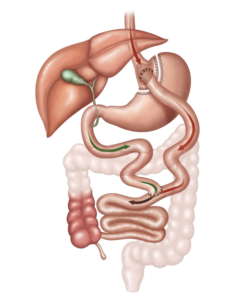Gastric Bypass
Our bariatric surgeons have extensive experiencing performing gastric bypass surgery. Learn about the advantages and disadvantages and risks of gastric bypass surgery.
The gastric bypass works in two ways: it creates a physical change in your body and a chemical change.
How is gastric bypass performed?
 We perform the gastric bypass as a laparoscopic procedure. This involves making five or six small incisions in the abdomen and performing the procedure using a video camera (laparoscope) and long instruments that are placed through these small incisions.
We perform the gastric bypass as a laparoscopic procedure. This involves making five or six small incisions in the abdomen and performing the procedure using a video camera (laparoscope) and long instruments that are placed through these small incisions.
Your bariatric surgeon creates a small stomach pouch using a surgical stapler. The pouch is surgically attached to the middle of the small intestine bypassing most of the stomach and the upper portion of the small intestine. Most patients are in the hospital for 2 days and back to work 2-3 weeks following surgery. Full recovery may take up to 4-6 weeks.
How does gastric bypass cause weight loss?
Gastric bypass is a restrictive, malabsorptive, and metabolic procedure. The physical change greatly reduces the size of your stomach and limits the amount of food that you can eat at one time. After eating a small amount of food, you will feel full very quickly and continue to feel full for several hours. It limits calorie absorption by bypassing a part of the small intestine, which can also affect the absorption of certain vitamins. Some vitamin supplements are required after surgery.
Gastric bypass also produces positive metabolic and chemical changes in many organs as a result of surgical anatomic manipulation. It helps the body to establish a new, lower, healthier body fat set point by changing the signals between the stomach, brain, and liver.
Average weight loss is between 60-70% of your excess body weight. Gastric bypass has an excellent track record in achieving and maintaining weight loss.
What are the risks of a gastric bypass?
There are risks that are common to any laparoscopic procedure such as bleeding, infection, blood clot formation, injury to other organs, or the need to convert to an open procedure. There is also a small risk of a leak from staple lines, nutritional deficiencies, anemia, ulcer formation. These problems are rare and major complications occur less than 1% of the time. Today, gastric bypass surgery is as safe as gallbladder surgery.
After surgery, a condition known as dumping syndrome can occur as a result of rapid emptying of stomach contents into the small intestine. This is sometimes triggered when too much sugar or large amounts of food are consumed. It is not a serious health risk but the effects can be unpleasant and can include nausea, weakness, sweating, faintness and diarrhea. Other complications can also occur.
Some early side effects may include nausea, heartburn, and regurgitation if you eat too quickly or too much. It is rarely reversed.
Gastric Bypass advantages:
- Rapid initial weight loss
- Longest follow-up data compared to other procedures – significant weight loss maintained at more than 10 years
- Average excess weight loss is generally higher than with gastric banding or sleeve weight loss surgery
- No postoperative adjustments are required
Gastric Bypass disadvantages:
- Longer operative time and recovery time than gastric band surgery
- Because a portion of the small intestine is bypassed, it reduces absorption of some nutrients like iron, calcium and vitamin B12
- Dumping syndrome
- Rapid weight loss can increase formation of gallstones
Our gastric bypass patients come to us from Winston-Salem, Burlington, Greensboro, High Point, Kernersville and nearby locations.You can start the process of working toward gastric bypass by attending a seminar. We offer online and live options to suit any need.